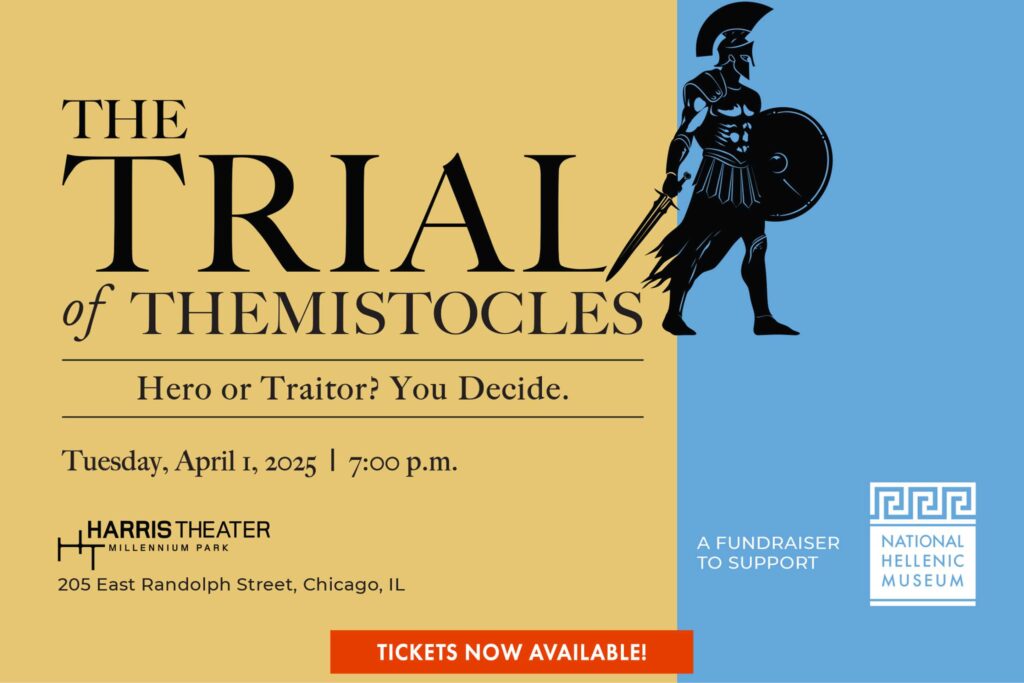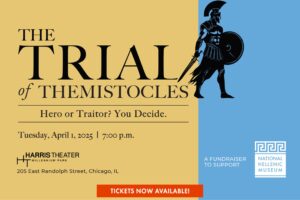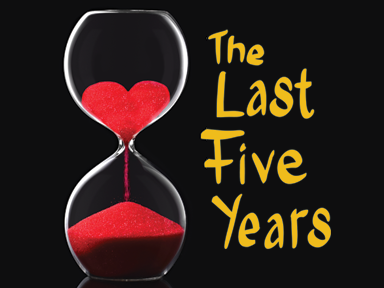
 ** At a time when the American judicial system appears to be under threat, we have “The Trial of Themistocles: Hero or Traitor? You Decide”, a recognition of the fact that the birthplace of democracy was Ancient Greece. The play reinforced the fact that democracy is not an abstraction and that the right to a trial by jury is an essential element in preserving justice for all. Held on election night Tuesday, April 1st and hosted by media personality Andrea Darlas, this special event was a fundraiser in support of the National Hellenic Museum, located in Chicago’s Greektown.
** At a time when the American judicial system appears to be under threat, we have “The Trial of Themistocles: Hero or Traitor? You Decide”, a recognition of the fact that the birthplace of democracy was Ancient Greece. The play reinforced the fact that democracy is not an abstraction and that the right to a trial by jury is an essential element in preserving justice for all. Held on election night Tuesday, April 1st and hosted by media personality Andrea Darlas, this special event was a fundraiser in support of the National Hellenic Museum, located in Chicago’s Greektown.
The story envisions a hypothetical trial of Themistocles, largely based on a true account of his life. Once “celebrated as one of Athens’ greatest leaders” and hailed as a hero for his instrumental naval strategy in securing a victory against King Xerxes in the Second Persian War, he was ostracized around 471 B.C.E. when the Athenians accused him of corruption and self-serving behavior. When he subsequently migrated to Persia and Xerxes’ son made him governor of the Greek-speaking province of Magnesia, this only added fuel to the fire among those who believed that Themistocles had always been a traitor. Calls were made for him to return to Athens for a trial which never took place. Today’s play, however, imagines a likely scenario where Themistocles defends himself against accusations of treason. But the setting is a modern-day courtroom where cultural elements having to do with America in 2025 are infused within this classic history with the aim of pointing out the strengths of our current legal system while adding some modicum of humor.
This one-of-a-kind, one-night event could boast of a star-studded assembly of Chicago’s lawyers and judges, many of whom were Greek-American. Those on stage played some type of role in the hypothetical courtroom, either as judges or as members of the jury or as prosecuting or defense attorneys. Those in the audience were awesome as well. Considering how many important and influential legal figures were all in one place at the same time, the event was highly successful. But none of this made up for the fact that the script had much to be desired and that the show was tedious, repetitive, and unnecessarily lengthy.
The focus of our attention was the defendant was Themistocles ((Jonathan Shaboo) and chief witness for the prosecution Aresenia (Judge Megan Goldish), who was Themistocles ex-girlfriend. But from the very beginning, I knew that having only one witness for the prosecution would be dicey—and it would be very difficult, if not impossible, to make any case of treason stick. Basically, this would spell issues with obtaining the burden of proof necessary to obtain a conviction—and apparently any letters that might “prove” the case against the defendant were somehow missing. In a nutshell, I more-or-less knew ahead of time that this would boil down to a “he-said/she said” argument, as perhaps did most of the audience. That’s one reason why everything seemed to go as slowly as it did: There was little or no tension in this show. To put this in perspective: While watching the mechanism of a jury trial is a good thing, this doesn’t make for a great play. There is a reason why TV court dramas like “Perry Mason” usually have a surprise witness or some kind of unexpected or quirky ending, simply because this can be more interesting to a general audience, especially when limited by time constraints.
To make up for this shortcoming, the script largely focused on the introduction of Aresenia, an entertaining “Stormy Daniels-like” character, who was Themistocles’ ex-girlfriend. While on the witness stand, she focused on his arrogance and his “bedroom habits.” She constantly drew an implicit analogy between the defendant and Donald Trump. While the salacious humor worked up to a point, things fell apart when Themistocles took the stand. With his quiet and respectful demeanor, he was nothing at all like Trump, making the whole analogy fall apart. And while some contemporary references to the White Sox and Niles West High School might have provided the occasional laugh, the script was most definitely not high art—and some jokes were simply not all that funny.
I was also disappointed in how evening progressed. As our tickets were being scanned, members of the audience were specifically told that inside our program was a packet of two chips, one blue and one white. We would be using them at the end of the evening to cast our vote regarding the trial. So two hours after the performance began (and after all the legal arguments were presented), the judges told us that volunteers would carry blue bags and white bags throughout the audience. We were instructed to put the blue chip into the blue bag if we thought Themistocles was guilty and the white chip into the white bag if we thought he was not guilty. Then they took a 10-minute break to allow the audience to cast their vote. Shortly afterwards, two people appeared on stage, each one carrying a white ewer presumably containing the chips of the appropriate color. They were supposed to weigh them against each other using the antique bronze scale of justice (that is, the traditional scale with the two pans). This was the moment in the show that I was waiting for. And drum roll, please… Was it worth the “weight”?
However, it became the judge’s prerogative not to count the chips, and the audience was not told why. This defeated the buildup in all of the promotional materials, not to mention what we were promised. To my mind, it would have taken a very short amount of time to put the chips on the scale, and so I was rather disappointed. Since we never learned how the audience voted, casting the chips turned out to be a pointless exercise and a complete waste of time that lengthened the performance unnecessarily. In fact, the show would have been much better had the audience never had any expectation of voting. That is the main reason that I am rating this production two stars instead of three.
What followed, however, was that the celebrity jurors on stage were each polled and had 30 seconds to explain their vote (which happened to be 11 to 1 of “not guilty”). And additionally, all three judges voted “not guilty” and were accorded somewhat more time to explain their viewpoints on the matter.
Considering that this show was being presented with the mission of supporting the Greek-American community, I was forgiving of the fact that the play could have been much better. It was great to see so many people in the audience and especially those of Greek descent specifically being honored. In fact, what was fantastic about the performance was how well the attorneys argued their positions and how well the judges and jury members spoke in general. The story illustrated just how important it is to preserve the rights of each citizen to a fair trial by their peers or a presiding judge who is supposed to be fair and impartial. While it also served as a reminder of the origins of American democracy, the judges were clear in pointing up that women and minorities in Ancient Greece could not vote and would have never made their way onto juries. They pointed out that today’s situation is far superior, where everybody—regardless of race, sex, religion, ethnicity, or gender—is guaranteed their rights. a quick correction to Julia’s review of the Trial of Themistocles.
correction
The audience’s chips were weighed on the scales of justice at the end of the event. There was a moment where the judges changed the order of proceedings – announcing their verdicts first – but at the end of the night, the scales were used and the audience’s verdict (not guilty) was the final vote of the night. Julia incorrectly notes that the audience’s chips were not used at all.
Now having said that, had the script been more concise and sharper, I believe that fewer people would have left the theatre just after they had voted. I’m assuming that a lot of them already understood the point of the exercise from the very beginning so that there was no need to stick around to the very end. The most important thing, however, was that the benefit helped to raise a good deal of money on behalf of the Museum, an excellent cause.
“The Trial of Themistocles: Hero or Traitor? You Decide” was held on April 1, 2025, at the Harris Theater, 205 East Randolph Street, in Chicago.
For more information about this show, see:
https://nationalhellenicmuseum.org/trial2025/
Tickets were $100; students $40.
The National Hellenic Museum is located at 333 S. Halsted Street, in Chicago. Go to https://nationalhellenicmuseum.org for more information.
Addendum: I want to include a matter that’s off-subject but indeed relevant. Because the weather was so chilly with a stiff breeze off the lake, I decided to walk inside the Pedway underground to Millennium Park, where the Harris Theatre is located. I entered from Macy’s basement, across from the Victorian stained glass windows. I walked eastward and saw a sign that said “to Millennium Park.” I haven’t been inside the Pedway for maybe thirty years. Some of it was the same, but a lot was very different. A lot of the décor has been changed and improved, while other areas (like several stairs) were literally crumbling and looked unsafe to climb. Unfortunately, before I got to the Metra Electric station, there were no more signs to direct me to Millennium Park (which, I knew was at ground level).
So I asked three different people where to go. The first was a security guard, who told me that the best way to get to Millennium Park was to go through these two sets of double doors and up the stairs, but instead, I found myself in a time warp: a tunnel that was probably not in use for thirty years (except perhaps by maintenance staff), and it was creepy. And there were no stairs. I walked farther along and found myself at the train tracks. So I asked one of the conductors how to get to Millennium Park. They routed me through the newer section, but I wound up exactly where I originally started from, that is, the place where you purchase the train tickets. So I approached another security guard, who, in response to my question, said, “I don’t know.” I said, “We’re practically underneath it. Aren’t there supposed to be stairs?” She said no. I asked, “Then how do I get to ground level?” She directed me to the stairs/escalator leading up to the Prudential Building. As a native Chicagoan, I knew that Millennium Park was right across the street from that building, and I eventually surfaced. But this experience was crazy. It was not just a matter of nonexistent signage but the state of disrepair in so many areas of the tunnel was unbelievable.






More Stories
“The Firebugs” reviewed by Julia W. Rath
“The Book of Grace”
“The Last Five Years” MILWAUKEE